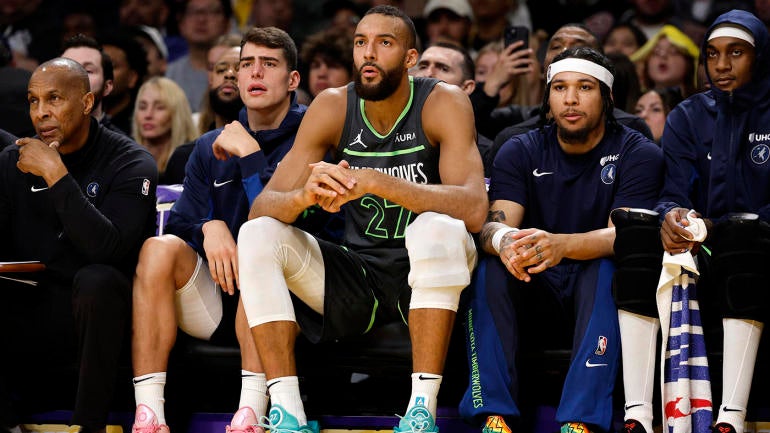
The Minnesota Timberwolves played "terrible offense" down the stretch of Game 1 of the Western Conference finals, coach Chris Finch told reporters on Wednesday: "Bad shots, turnovers, no composure." Jaden McDaniels surely regrets throwing the jump pass that landed in the hands of Dallas Mavericks star Luka Doncic with about two minutes left, and Mike Conley surely regrets turning down an open floater to force a lob to Rudy Gobert -- another Doncic steal -- a couple of possessions later.
The numbers confirm Finch's assessment. Over the final 11 minutes of the 108-105 loss, Minnesota scored 16 points on 6-for-18 shooting, with five turnovers and an offensive rating of 72.7. In the last four-and-a-half minutes, the Wolves scored six points on 2-for-6 shooting, with three turnovers and an offensive rating of 66.7.
It is difficult to win a playoff game when you score only 43 points in the second half, as the Wolves did in the series opener. Minnesota almost pulled it off, though, because of its defense. It held the Mavericks to 113.7 points per 100 possessions (as a point of reference, this is exactly what the Houston Rockets, the league's 20th-best offensive team, put up in the regular season) and limited them to 25 3-point attempts, the fewest they've taken since Dec. 31, 2021.
The Wolves' strategy was clear: They wanted to force Doncic and Kyrie Irving into contested 2s, and they didn't want to give up wide-open corner 3s. There was a lot of grouching about Gobert being in drop coverage on the broadcast, but it worked. In fact, it worked so well that the game might not have come down to crunch time if they'd found a way to be halfway decent without Gobert on the floor.
Gobert played 38 minutes, during which time Minnesota outscored Dallas by 10 points and held the Mavs to 100 points per 100 possessions. In the other 10 minutes, Dallas scored 165 points per 100 possessions. The Mavs outscored the Wolves 62-38 in the paint, another talking point during the game, but much of that damage was done when Gobert was on the bench.
| | GOBERT ON | GOBERT OFF |
|---|---|---|
MINUTES | 38 | 10 |
DAL PTS | 75 | 33 |
MIN PTS | 85 | 20 |
DAL OFFRTG | 100 | 165 |
MIN OFFRTG | 110.4 | 90.9 |
DAL EFG% | 48.5% | 66.7% |
DAL OREB% | 24.3% | 57.1% |
DAL FTA RATE | 18.2% | 23.8% |
DAL PTS IN PAINT | 34 | 28 |
DAL FGM-FGA | 29-66 | 14-21 |
"As soon as Rudy left the court, they just drove, drove, drove," Finch said. "We were not very good on the ball, we were not very good at the rim. We were soft there."
On Minnesota's very first defensive possession without Gobert, Irving rejected a screen, attacked the basket and finished:
Over and over, Dallas found high-percentage looks at the rim. Some of them were in transition and some were against more aggressive pick-and-roll defense, but, alarmingly, many were the result of the Mavericks simply beating the Wolves off the dribble.
"I thought it was the penetration that hurt us more than the pick-and-roll," Finch said.
There is some irony here. Despite Gobert winning his fourth Defensive Player of the Year award recently, entering the series some thought the Mavs might neutralize him the same way they did when he was a member of the Utah Jazz in the 2022 playoffs: By spacing the floor and attacking one-on-one. They did indeed find success doing a version of that (albeit without going small) in Game 1, but only when Gobert was off the court.
During the regular season, Minnesota was 3.5 points per 100 possessions better with Gobert than without him in non-garbage-time minutes, according to Cleaning The Glass, but it was the difference between being absolutely ludicrous (107.8 points per 100 possessions) and merely amazing (111.3 per 100). When Gobert missed Game 2 against the Denver Nuggets in the second round after the birth of his son, the Timberwolves held Denver to 89.4 per 100, per CTG, and won in a blowout. The question is not whether or not Minnesota can play top-tier defense without Gobert, but whether or not it can play top-tier defense without Gobert in this series.
He is far and away the team's best rim protector, and without him, there's more pressure on the Wolves to hold up one-on-one (and scramble when the opponent puts them in rotation). As a rule, you don't want to be in rotation against Dallas, and holding up one-on-one against Doncic and Irving is easier said than done.
If Friday's Game 2 is tight late in the fourth quarter, the Wolves need to execute much better than they did on Wednesday. Ideally, though, they won't even need to worry about that, as they will have played a more complete game than they did in the opener, non-Gobert minutes included. He is their defensive anchor, but if they're completely adrift without him, they won't survive this matchup.


















